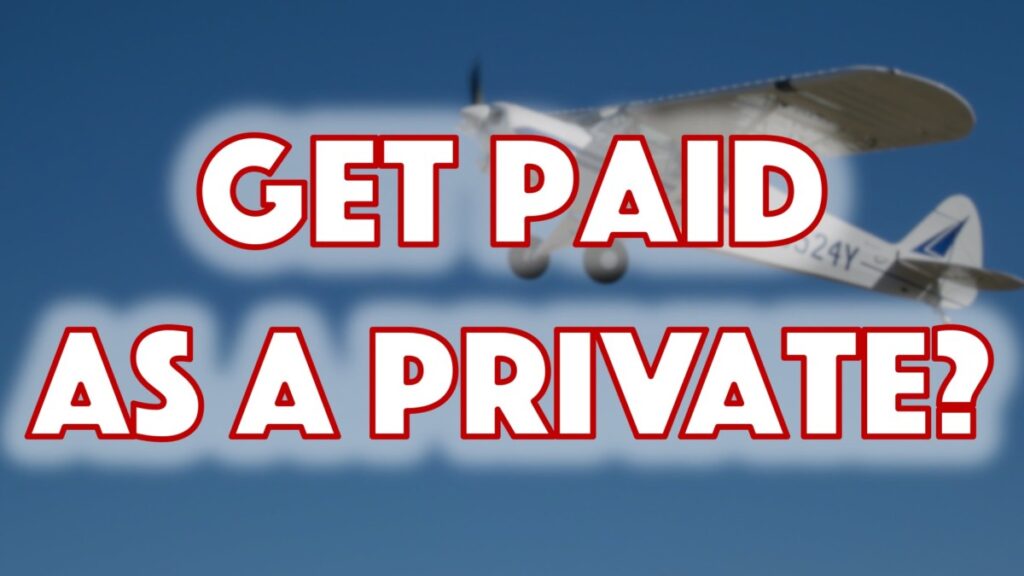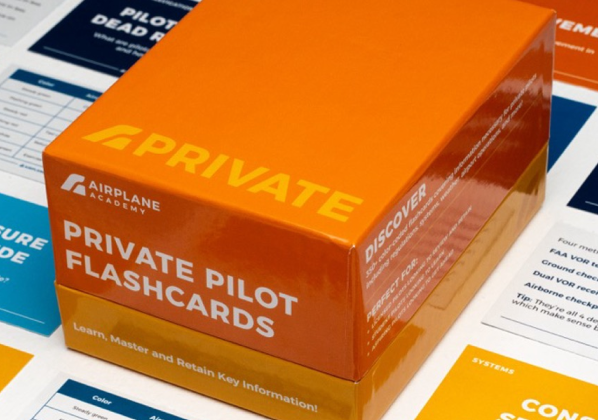
Becoming a private pilot is no small feat. It involves a lot of training (ground and flight hours), a decent financial investment, and a lot of hard work. Even if you don’t plan on becoming a professional pilot one day, it still would be nice if there were some opportunities to make back some of that financial investment or offset your ongoing costs of pursuing aviation. So it’s a common question to ask: can you get paid as a private pilot?
In most circumstances you need a commercial pilot’s license to be paid to fly. However per 14 CFR 61.113 you can be paid to fly with only a private pilot’s license serving as a glider tow pilot (if you meet the minimum qualifications), being a production test pilot for light sport aircraft, or demonstrating aircraft to potential buyers as an aircraft salesman. You are also allowed to be reimbursed for your pro-rata expenses in certain situations as a private pilot.
In the rest of this post we’ll unpack the regulation that covers the private pilot’s privileges and limitations in regards to receiving compensation. Generally speaking you are pretty limited in your options for getting paid as a private pilot but there are a few situations the FAA allows.
When can you receive compensation as a private pilot?
14 CFR 61.113 covers the private pilot privileges and limitations for when serving as pilot in command. We’ll follow the same order as the regulation as there are seven instances where the FAA says you can receive money as a private pilot. Some of them are intentionally vague which makes it hard to interpret. I think the FAA wanted it this way so that they can default to their own discretion in situations that might be a bit of a gray area.
Disclaimer: This article does not include legal advise and is solely my opinion and non-lawyer interpretation of the regulations. Use your own discretion and decision making! When in doubt, call your local FSDO (flight standards district office) with your particular questions. You can easily find them with a quick google search.
- 61.113(a) – Except as described in parts b-h, you can’t get paid as a private pilot. The FAA really starts this off by saying that you really need a commercial pilot’s license in order to get paid to fly, in almost any scenario. If you are trying to play in a gray area, I would recommend you not do that and just go get your commercial pilot’s license. Trying to skirt the rules (unless you are very clearly in one of the situations below) isn’t worth it.
- 61.113(b) – you can be paid if it’s incidental to the business and are not carrying passengers or property. This is admittedly a confusing regulation because what really constitutes “incidental to the business”? I think what the reg is trying to say here is that if there is a situation where in a business setting you can be paid to fly somewhere on a non-recurring basis (i.e. incidental, or purely an one time incident where this isn’t a normal thing) and not carry passengers or property, that’s excusable. I can’t think of many situations where this would even happen and not be recurring. For example if your company had an airplane and wanted you to fly it somewhere to see a customer but only that one time, that might fall under this regulation. Or if you couldn’t get somewhere by vehicle and could rent an airplane on a one-time basis to go by yourself (without passengers or property) somewhere for business purposes, that might be okay. This is a gray area though so I wouldn’t rely on it.
- 61.113(c) – you can be reimbursed for your pro rata expenses on a private pilot mission, limited to fuel, oil, airport, and rental costs. In other words, if your friend asks if you can fly them somewhere and they’ll split fuel and rental fees with you (pro rata, or equally split), that’s okay. They can’t pay you anything above this amount though. If you had a commercial license, they would be allowed to pay you for this, but this is also subject to a few other rules such as you not being able to advertise this route that you are flying and offer it to people (i.e. “holding out”). We can cover that in another post, though.
- 61.113(d) – you can be PIC for a charity, non-profit, or community event flight as described in 91.146. Part b(7) of 91.146 says that the operator can be reimbursed for their pro rata share of the expenses, limited to fuel, oil, airport, and rental costs. You kind of have to go down the rabbit hole here to piece together what this regulation is meaning across its various parts. I believe it to mean that if there’s a certain local non-profit flight that you can offer to fly for, if that event meets certain conditions than you can have your expenses covered.
- 61.113(e) – you can be reimbursed your pro rata expenses for local search and location operations. This is limited to fuel, oil, airport, and rental costs.
- 61.113(f) – as an aircraft salesman you can demonstrate the aircraft to a prospective buyer if you have 200 or more logged hours. It doesn’t specifically say that you can be paid to do this demonstration flight, but I interpret the part of “as an aircraft salesman you are allowed to demonstrate the airplane” as a situation where you effectively are paid to do it. This seems like a gray area, and practically speaking, if you are going to be an aircraft salesman you are more than likely going to need your commercial license anyways. So there’s little point to try to skirt the regulations here and perform that role as a private pilot.
- 61.113(g) – you can be paid to tow gliders as a private pilot. This is maybe the only clear cut situation where you can fly specifically for hire without a commercial pilots license. Section 61.69 covers the training and experience requirements to be eligible for this job but it’s very doable.
- 61.113(h) – you can serve as a production flight test pilot for light sport aircraft. Again while this regulation doesn’t directly say you can be paid to be a test pilot here as a private pilot, but I interpret this as you can be paid to do this role. You wouldn’t be a test pilot just on a volunteer basis so I think this reg is here to say that you can do this and be paid. But again this is a gray area and practically speaking the best bet is just to get your commercial license and you’ll have a hard time being hirable as a test pilot if you only have your private.
Related Questions
As you saw above, the only clear cut situation in my mind where the FAA says you can definitely be compensated to fly as a hired pilot with only a private pilot’s certificate is to tow gliders. There are some other gray areas such as performing aircraft demonstrations as a salesman to potential buyers, or serving as a production test pilot for light sport aircraft, but the safest bet is to just get your commercial rating if you are planning on being paid to fly. Here are some other questions that frequently come up on this topic.
Do I need a commercial pilot’s license to tow banners?
This is a common question. Since you are allowed to tow gliders with only a private pilot’s license, wouldn’t it make sense that you could also tow banners with only a private pilot’s license? You have to look through a couple regulations to get the final answer.
Part 91.311 says that banner towing can occur when it’s in accordance with a certificate of waiver issued by the FAA. The certificate of waiver 3-64(A)(4) says that “when banner towing operations are conducted for compensation or hire, the pilot must have at least a limited Commercial Pilot Certificate (without an instrument rating) and at least a second-class medical certificate.”
So, yes, you need a commercial pilot’s license to tow banners. You don’t need an instrument rating though (whereas you would for a commercial pilot’s license that isn’t limited to a certain airport radius or daytime operations).
Is it legal to split fuel costs with someone as a private pilot?
Yes. Per 14 CFR 61.113(c) you can be reimbursed for your pro rata expenses on a private pilot mission, limited to fuel, oil, airport, and rental costs. Pro rata just means your fair share, or split evenly. So if it’s just you and another person, they can split fuel, oil, airport, and rental costs 50/50 with you. If it’s you and two passengers you can split those costs three ways, etc.
Can I receive non-monetary compensation in exchange for flying?
Technically, no, although this might be a gray area if the value of the non-financial compensation you are receiving for the flight is a fair reimbursement for your pro-rata expenses of the flight. 14 CFR 61.113(c) says you can be reimbursed for your pro rata expenses on a private pilot mission, limited to fuel, oil, airport, and rental costs. I’m not a lawyer and I’m not your lawyer so use your best judgement here.
Will I need an ATP certificate to fly for hire?
You don’t necessarily need an ATP certificate to fly for hire, although most airlines in the United States will require you to have one. For more reading on this, see our article comparing private pilot, commercial pilot, and ATP certificates.
How does the FAA monitor and enforce this?
This is kind of like asking how do police officers monitor and enforce speed limits. Do people speed and not get caught? Of course. Does that make it right or less wrong? No. A lot of aviation is a bit of an honors system where you aren’t always going to get audited or checked, but in the event you are, the consequences can be serious if you were found to not be following the rules.
Conclusion
The bottom line is that if you want to fly for hire, just go get your commercial license. If you are legitimately trying to get paid to fly, it isn’t worth trying to bend the rules as a private pilot, when the right thing to do is just get your commercial license. It’s one of the less expensive ratings and isn’t hard. If you are in a gray area in terms of getting compensated to fly as a private pilot, the most conservative approach is to just steer clear of it. Do it the right way. Plus if you don’t have your commercial you won’t be as marketable. If you are towing gliders and someone there wants to hire you also for another role, without your commercial license you can’t really do much. Get the license and make yourself available for more opportunities.
Blue skies!
PS: I said it above, but I’ll say it again. This article does not constitute legal advice and is solely my opinion and non-lawyer interpretation of the regulations. Use your own discretion and decision making!



